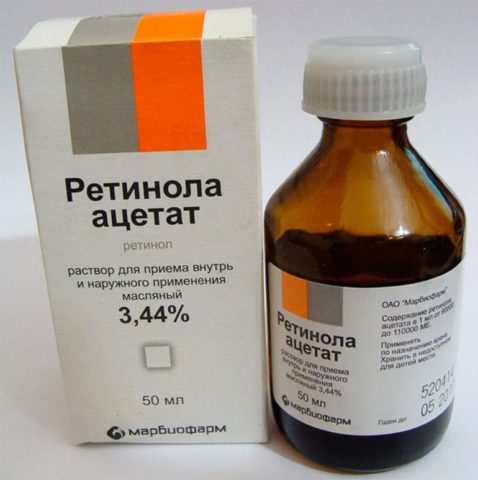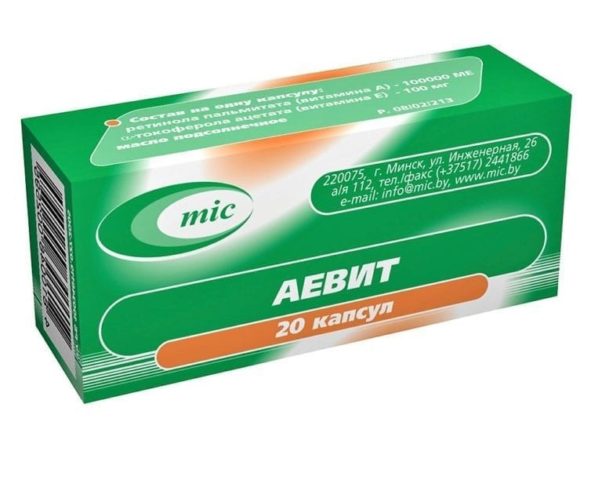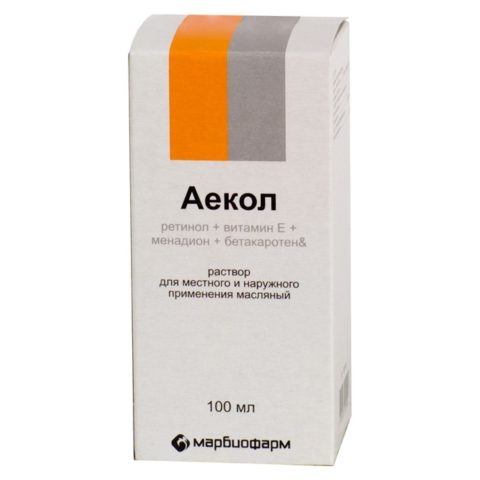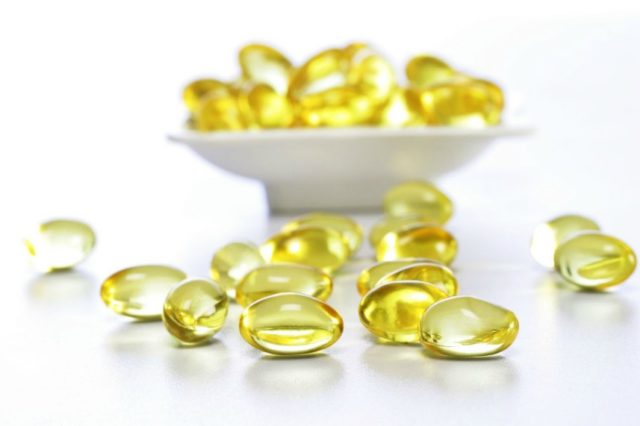Content
- 1 The benefits of vitamin A for the body
- 2 Daily intake of vitamin A
- 3 Symptoms of a lack of vitamin A in the body
- 4 What Causes Vitamin A Deficiency
- 5 Foods containing vitamin A
- 6 Preparations containing vitamin A
- 7 How to take vitamin A capsules for adults
- 8 Interaction of vitamin A with other vitamins and drugs
- 9 Side effects and contraindications of vitamin A
- 10 Symptoms of an allergy to vitamin A in oil
- 11 What can replace vitamin A
- 12 Conclusion
Vitamin A is found in many foods, but sometimes a deficiency of a useful substance occurs in the body. To eliminate the lack of retinol, you need to revise your diet or temporarily add pharmacy preparations that contain the desired compound to it.
The benefits of vitamin A for the body
Vitamin A is fat-soluble and is found in most foods in high or low quantities. Another name for vitamin A is retinol, and it is irreplaceable for the human body. With its lack, health rapidly deteriorates, and chronic diseases appear. Vitamin A is also isolated in the form of beta-carotene - this substance is a building material for retinol.
Vitamin A plays a particularly important role for the skeletal system and for vision, metabolism and skin.
For hair and face
The normal level of the nutrient in the body is responsible for the strength, shine and rapid growth of hair. If retinol is contained in the blood in sufficient quantities, then the hair does not fall out and does not split at the ends, obediently lends itself to styling and retains its volume.
Also, the biological action of vitamin A helps to maintain healthy skin. Retinol protects the scalp from dandruff and flaking, prevents premature aging of the epidermis. If the blood contains a useful compound in a normal amount, then the face remains fresh and taut, the sunburn evenly lays on the skin and does not appear burns from ultraviolet radiation.

For sight
Retinol promotes the formation of the rhodopsin substance in the retina. Rhodopsin is responsible for the sensitivity of the visual organs to light signals, helps the retina to adapt faster when changing lighting. If there is not enough retinol in the blood, against the background of its shortage, violations of "twilight vision" often occur, myopia and rapid eye fatigue develop.
Vitamin A for nails
Vitamin A is responsible in the body for the strength of bone tissue and, among other things, helps to maintain healthy nails. If it contains a normal amount in the blood, it prevents the separation of the nail plates and stimulates their rapid growth, protects the nails from the appearance of ribbing, and helps to eliminate excessive dryness and fragility of the nail.
For the immune system
Vitamin A is recommended for patients with weakened immunity. It protects the body from infections and viral diseases, stimulates cell renewal. You need to use capsules containing a useful substance inside, and with a cold and colds, vitamin A is often instilled in oil into the nose.
If the diet contains enough vitamin A, it reduces the risk of developing cancer and autoimmune diseases.
Slimming
The benefits and harms of vitamin A for women are manifested with a diet.Retinol is responsible for proper metabolism and accelerates the absorption of beneficial compounds. If you are overweight, it is imperative to control the level of vitamin A. Vitamin A increases the body's endurance during exercise and thus makes sports more effective. In addition, if the tissues contain enough retinol, then toxins and harmful toxins leave the body faster, which also contributes to weight loss.
For children
Vitamin A is especially important for children. In the child's body, he answers:
- for immunity and the body's ability to regenerate;
- for bone health;
- for visual acuity - this is especially important for schoolchildren;
- for the normal functioning of the digestive and respiratory system;
- for energy reserves.
Vitamin A is essential for normal growth and mental development. If there is enough retinol in the diet, then the child is always energetic and does not suffer from chronic fatigue, and also copes well with school loads.

Daily intake of vitamin A
The daily dosage of vitamin A depends on the person's age and gender. The official recommendations of doctors look like this:
- adult men need to consume up to 1000 mcg per day, or about 1 mg;
- adult women need to get 800 mcg of retinol per day, or 0.8 mg;
- for adolescents from 10 years of age to adulthood, the norm is also from 0.8 to 1 mg per day;
- children from 3 to 6 years old need 500 mcg, or 0.5 mg, every day, and children from one to 3 years old need 450 mcg per day, or about 0.4 mg;
- infants under one year old need only 0.4 mg of retinol every day.
Symptoms of a lack of vitamin A in the body
If, for one reason or another, the body contains too little retinol, it manifests itself with noticeable symptoms. Signs of a deficiency include:
- dryness and flaking of the skin, its premature aging;
- blurred vision, night blindness, conjunctivitis and dry eyes;
- fragility and dullness of hair, premature gray hair;
- brittle nails and deformation of the nail plate.
If the body does not contain enough vitamin substances, a person begins to get colds more often and it is more difficult to endure inflammatory processes.
What Causes Vitamin A Deficiency
Normally, retinol enters the human body every day from the products it contains. Deficiency most often develops against the background of:
- unbalanced and poor nutrition, which almost does not contain the necessary compound;
- chronic and acute gastrointestinal diseases;
- lack of fat in the daily diet;
- lack of tocopherol.
A decrease in the level of vitamin A can occur after surgical resection of the small intestine or with a deterioration in the absorption of nutrients by the small intestine.

Foods containing vitamin A
To find out where vitamin A is found most, a visual table will help:
|
Product |
Vitamin A content (μg) per 100 g |
|
Fish fat |
25 000 |
|
Beef liver |
8 367 |
|
Parsley |
950 |
|
Spinach, dill and celery |
750 |
|
Carrot |
690 |
|
Dried apricots |
583 |
|
Butter and red caviar |
450 |
|
Broccoli |
386 |
|
Apricots |
267 |
|
Chicken eggs |
260 |
|
Persimmon |
200 |
|
Pumpkin |
250 |
|
Red bell pepper |
250 |
Preparations containing vitamin A
If the daily diet contains too small amounts of retinol, it makes sense to resort to pharmacy supplements:
- Retinol acetate... The drug is presented in the form of drops, you can use it in 1-2 drops both inside and during external procedures.

- Aevit... The drug is available in light yellow capsules, the composition contains not only vitamin A, but also tocopherol.

- Aekol... Another preparation in capsules containing retinol and tocopherol, which enhances its absorption.

With a pronounced deficiency, retinol can also be obtained from the multivitamin complexes in which it is contained. From such as Pikovit, Vitrum, Alphabet or Multi-tabs.

How to take vitamin A capsules for adults
Instructions for the use of vitamin A capsules depend on the specific preparation. But on average, 1 capsule of retinol contains from 33,000 to 100,000 IU of the active substance, and the same daily amount of the substance is prescribed by doctors for therapeutic purposes to patients. For children, the dosage is calculated individually, depending on age and weight, but usually does not exceed 20,000 IU.
Thus, usually an adult needs to consume only 1 capsule per day. The supplement is taken on a full stomach, 15 minutes after a meal. In total, it is necessary to use retinol for a month - vitamin A accumulates in the body, and if you take it too long, it will begin to be harmful.
Interaction of vitamin A with other vitamins and drugs
The vitamin substance is especially well absorbed with the following substances:
- tocopherol;
- ascorbic acid;
- zinc;
- iron;
- selenium.
Retinol can be taken simultaneously with drugs that contain several of the listed substances. Many vitamin complexes combine A, C and E, as well as zinc and iron.
But with vitamin D, the substance is poorly absorbed - with a deficiency of retinol, it is not recommended to take calciferol at the same time, since they neutralize each other's action. Also, doctors do not advise combining the use of supplements that contain a high amount of retinol with the intake of multivitamins, where the same substance is present. Vitamin A is poorly combined with antibiotics and hormonal drugs.
Foods that contain retinol are recommended to be consumed with fat-containing foods. For example, carrots are best eaten with a little oil to help absorb vitamin A.

Side effects and contraindications of vitamin A
Side effects are manifested mainly with an overdose of the substance. If vitamin preparations are taken not according to instructions and without medical supervision, it is possible that:
- nausea and vomiting;
- hair loss;
- baldness;
- dry skin;
- joint pain;
- headaches;
- jaundice.
If signs of overdose appear, it is necessary to urgently stop using the supplement and consult a doctor.
In some conditions, a beneficial substance may be completely contraindicated. It is impossible to use preparations that contain a vitamin compound:
- with cirrhosis of the liver and renal failure;
- with viral hepatitis;
- with increased allergic sensitivity;
- with hypothyroidism.
Also, vitamin supplements should not be consumed in the early stages of pregnancy and during lactation.
Symptoms of an allergy to vitamin A in oil
Since vitamin A belongs to the fat-soluble category, it is produced in liquid form or contained in capsules in combination with an oil base. Such drugs often cause allergies, it can be explained by both hypervitaminosis and intolerance to a particular oil in the composition of the drug.
Allergy symptoms include:
- itching, redness and peeling of the skin;
- allergic rhinitis;
- skin rashes and hives;
- redness of the eyes, pain and lacrimation.
In severe cases, allergies can lead to suffocation, facial swelling and even angioedema. If a useful substance is contained in the oil and at the same time causes a negative reaction, then you need to refuse it and look for other drugs to replace it.

What can replace vitamin A
The vitamin substance itself in the human body cannot be replaced by anything, it plays too important a role and is necessary for maintaining health. However, negative reactions in people are caused not by the properties of vitamin A, but by additional components that are contained in pharmaceutical preparations and food products. They should normally increase digestibility, but this is not always the case.
If pure retinol acetate causes allergies, you can purchase a product from another manufacturer, which contains another vegetable oil as a solvent. Most often, this will solve the problem. You can also replace a pure drug with multivitamin supplements. Most of all, doctors recommend taking into account which fruits contain vitamin A, and replenishing its deficiency with food.
Conclusion
Vitamin A is found in common foods, pharmacy capsules and liquid solutions designed to fill retinol deficiencies. For health, a useful substance plays a fundamentally important role, but it should be used only as directed by a doctor in order to avoid harm.

